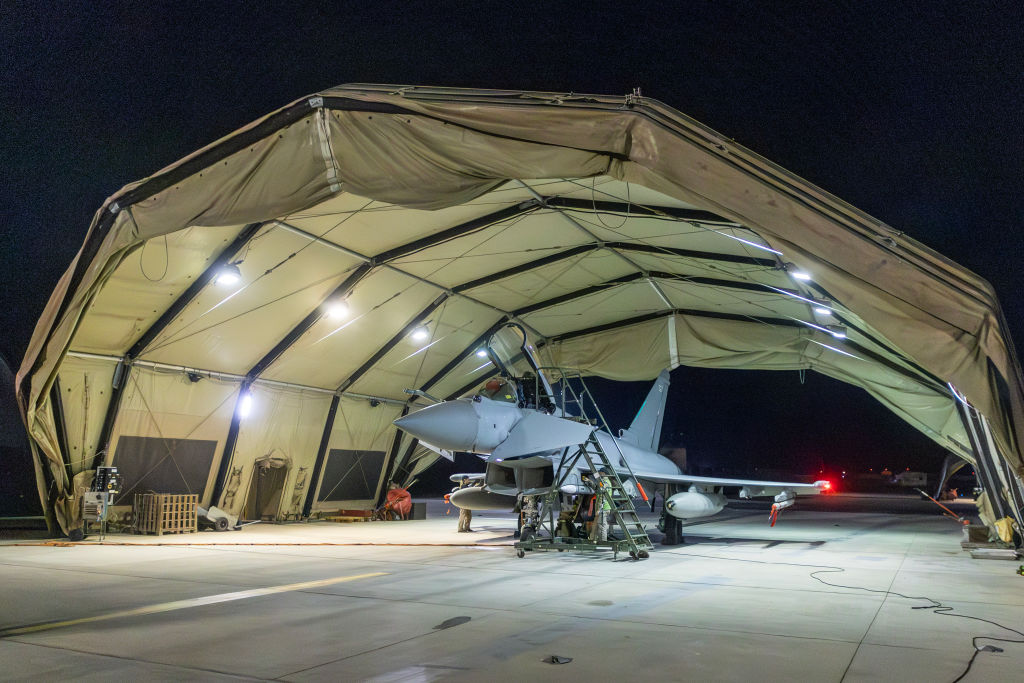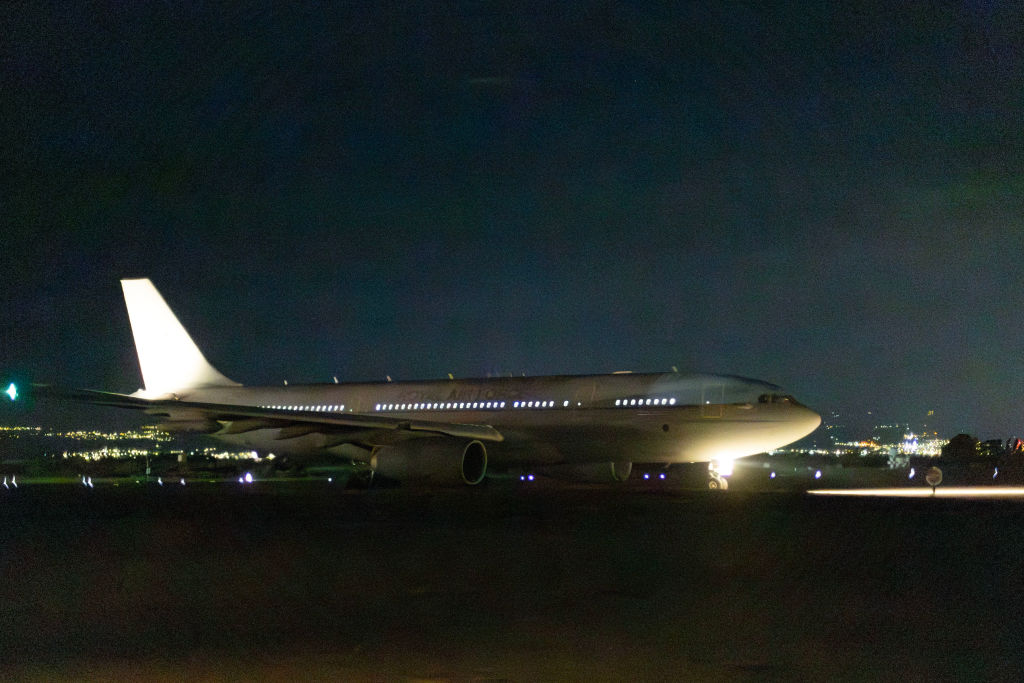
The ability of Iran proxy Houthi terrorists to threaten merchant shipping “has taken a blow”, the MOD said after a major strike against 60 targets in Yemen by the U.S. and UK by warships, aircraft, and a submarine.
The United States and the United Kingdom made good on days of warnings that continued attacks on global trade in the Red Sea would incur “consequences” overnight into Friday morning with what had been described as a “massive retaliatory strike” on Houthi targets in Yemen.
Iran-backed Shiite Houthi militias have been striking at civilian merchant ships carrying the world’s trade including cargo containers, cars, and oil through the strategically crucial Red Sea in solidarity with Hamas’s attack on Israel since November. According to the United States, they have launched 27 separate attacks, some of which have hit targets.
United States Central Command (CENTCOM) said the strikes targeted “radar systems, air defense systems, and storage and launch sites for one-way attack unmanned aerial systems, cruise missiles, and ballistic missiles”. The Associated Press, citing anonymous defence sources, said 60 targets at 16 sites were attacked in the strike.
On Jan. 11 at 2:30 a.m. (Sanaa time), U.S. Central Command forces, in coordination with the United Kingdom, and support from Australia, Canada, the Netherlands, and Bahrain conducted joint strikes on Houthi targets to degrade their capability to continue their illegal and… pic.twitter.com/bR8biMolSx
— U.S. Central Command (@CENTCOM) January 12, 2024
Four @RoyalAirForce Typhoons have conducted precision strikes on two Houthi military targets alongside US forces.
The threat to innocent lives and global trade has become so great that this action was not only necessary, it was our duty to protect vessels & freedom of navigation pic.twitter.com/tbN7ncJYpF
— Rt Hon Grant Shapps MP (@grantshapps) January 12, 2024
The strike was committed by a combination of warships, aircraft, and a submarine. U.S. surface ships including an Arleigh Burke-class destroyer and submarines launched Tomahawk cruise missiles and F/A-18E Super Hornets from the aircraft carrier USS Dwight D. Eisenhower. The warships of the British Royal Navy (RN) in the area lack a major stated land attack capability, having been fitted ‘for but not with‘ land strike cruise missiles, so the British contribution was land-launched jets from the Royal Air Force (RAF) instead.
The British minister of defence Grant Shapps said in a statement Friday morning that four RAF Typhoons launched from the British sovereign base in Cyprus and “conducted precision strikes on two Houthi military targets alongside US forces”. The distance involved to strike targets in Yemen from the eastern Mediterranean is considerable, and involves complications including air refuelling tankering and overflight of third nations. It is possible the British Prime Minister’s call with his Egyptian counterpart on Thursday was meant to facilitate a corridor.
The British Typhoon jets were supported by a RAF Voyager refuelling tanker and dropped Paveway IV laser-guided bombs on their targets. The UK Ministry of Defence (MOD) said in a statement of the targets that: “One was a site at Bani in north-western Yemen used to launch reconnaissance and attack drones. A number of buildings involved in drone operations were targeted by our aircraft.
“The other location struck by our aircraft was the airfield at Abbs. Intelligence has shown that it has been used to launch both cruise missiles and drones over the Red Sea. Several key targets at the airfield were identified and prosecuted by our aircraft.”

AKROTIRI, CYPRUS – JANUARY 12: In this handout image provided by the UK Ministry of Defence, an RAF Typhoon aircraft returns to berth following a strike mission on Yemen’s Houthi rebels at RAF Akrotiri on January 12, 2024 in Akrotiri, Cyprus. (Photo by MoD Crown Copyright via Getty Images)

AKROTIRI, CYPRUS – JANUARY 11: In this handout image provided by the UK Ministry of Defence, an RAF Voyager aircraft takes off from RAF Akrotiri to join the U.S.-led coalition to conduct air strikes against Yemen’s Houthi rebels on January 11, 2024 in Akrotiri, Cyprus. (Photo by MoD Crown Copyright via Getty Images)
The MOD said in terms of results of the night’s raid by the U.S. and UK: “The detailed results of the strikes are being assessed, but early indications are that the Houthis’ ability to threaten merchant shipping has taken a blow”.
The strikes came hours after the U.S. and UK warned there would be “consequences” if Houthi rebels kept attempting to strike merchant shipping, and the British defence minister said in terms of a Western response, observers should “watch this space”. President Biden said in a statement following this morning’s retaliation that Houthis “endanger freedom of navigation in one of the world’s most vital waterways… These attacks have endangered U.S. personnel, civilian mariners, and our partners, jeopardized trade, and threatened freedom of navigation.”
He reiterated that “Last week, together with 13 allies and partners, we issued an unequivocal warning that Houthi rebels would bear the consequences if their attacks did not cease”. President Biden said the strikes followed an “extensive diplomatic campaign” and are a “clear message” that “the United States and our partners will not tolerate attacks on our personnel or allow hostile actors to imperil freedom of navigation in one of the world’s most critical commercial routes”.
The President said he would authorise further strikes “as necessary”.
USN and Royal Navy on Defence as Houthis Launch Largest Attack on Red Sea Shipping Yet https://t.co/N77EKPvFE6
— Breitbart London (@BreitbartLondon) January 10, 2024
One of the clear messages coming through U.S. and UK communications about the strikes is how they commanded further support than simply the pair of nations, appealing to an idea of a broader coalition against the Iran-backed Houthis. Centcom said the strikes received unspecific support from “Australia, Canada, the Netherlands, and Bahrain” and President Biden said “a coalition of more than 20 nations committed to defending international shipping and deterring Houthi attacks in the Red Sea.”
Perhaps detecting something was afoot, Houthi leader Abdul Malik al-Houthi pre-empted the strikes with a statement on Thursday, promising revenge of his own. He is reported to have said: “Any American attack will not remain without a response. The response will be greater than the attack that was carried out with twenty drones and a number of missiles… We are more determined to target ships linked to Israel, and we will not back down from that.”
Another Houthi leader Abdulsalam Jahaf backed this up, writing: “We will confront America, kneel it down, and burn its battleships and all its bases and everyone who co-operates with it, no matter what the cost… We will tread on America with our feet”.
The strikes follow months of attacks on merchant trade which had flown through the Red Sea but that now has, to a major extent, been expensively re-directed around the Horn of Africa. The Red Sea is crucial to global trade and the West in particular because it, with the Suez Canal, offers considerable time and cost-saving for imports flowing from the workshops of China and the East, and energy from the oilfields of the Middle East, to Europe and the American Eastern Seaboard.
Hapag-Lloyd Container Ship Set Ablaze in Red Sea After Yemen Missile Strike https://t.co/wbtk8VWq5b
— Breitbart London (@BreitbartLondon) December 15, 2023
With the Red Sea effectively closed to traffic — even the most optimistic shipping firm Maersk has now acknowledged it is a problem they expect to last for months — shipping costs and insurance for the enormous container ships which can carry a billion dollars worth of merchandise aboard per voyage has soared. As reported, these cost increases as passed onto consumers in the import-dependent West pose a major risk of wiping out progress by governments to stem the impact of inflation.
As stated:
Bank of England deputy governor Sarah Breeden has warned rising shipping prices may be a hammer blow to the hopes of many Western governments hoping to get inflation under control…. “supply constraints can really matter for monetary policy… We have developed a tool kit to track supply constraints for our inputs on what is happening [in global trade]. Given events in the Red Sea, we can incorporate those into our expectations. It is a volatile situation that is only just arising, but we have highlighted and incorporated in our latest projections the upside risks to inflation from developments in the Middle East.”
The strikes are an apparent failure of the very basic defensive principle si vis pacem para bellum, that Western and particularly American military might should be so overwhelming that actual military operations should be unnecessary. Nevertheless, today’s counterattack is a return to the core founding principles of the United States Navy, being to defend American trade interests abroad from the actions of Islamic pirates.
For Import-Dependent West, Costs Will Add Up As Long as Houthis Keep Red Sea Closed https://t.co/jaKab0GdSJ
— Breitbart London (@BreitbartLondon) December 21, 2023




